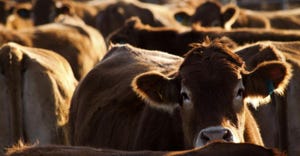November 18, 2014

The American Humane Association (AHA) recently released results of a survey of 5,900 U.S. consumers regarding food production and their preferences. A whopping 94.9% of respondents described themselves as very concerned about farm animal welfare -- a jump from 89% in AHA’s 2013 survey.
The survey revealed that respondents considered food labeled “humanely raised” as more desirable than “antibiotic-free,” “organic,” and “natural.”
According to beefproducer.com, “More than three-quarters (75.7%) stated that they were very willing to pay more for humanely raised eggs, meat, and dairy products, up from 74% last year. Americans expect humanely raised food and are willing to pay more for it.”
Subscribe now to Cow-Calf Weekly to get the latest industry research and information in your inbox every Friday!
Half of respondents said humanely raised food wasn’t available at their local grocery stores, and one-third of those surveyed said humanely raised products were too expensive. Just 9% said they didn’t know the difference.
As the holiday season draws near, AHA is also urging Americans to “set a humane table for the holidays and support humane farm practices.”
While I’m all for farmers finding a niche and earning a premium for producing food the consumer wants, I admit that I’m concerned by the possible implications of labeling certain foods as humanely raised. Here are three questions I’m pondering on the topic:
1. If it’s not labeled, does it mean the animal was abused?
For starters, to me, the implication to consumers might be that, unless it’s labeled “humanely raised,” everyone else in the business is abusing their animals or taking shortcuts in animal care. Of course, we know this isn’t true, as animal welfare goes hand-in-hand with ranching. Not only is it the right thing to do, but it doesn’t make economic sense to abuse our livestock. I find it sad that we need to underscore the quality of our animal treatment to consumers.
2. Does humanely raised mean animals must be treated like humans?
I also worry that humanely raised could foster the “humanizing” of animals. Today’s consumer is 3-4 generations removed from the family farm, so many aren’t as familiar with the concept of the circle of life that farm kids generally learn at a young age. Conversely, many Americans view the animals they're most in contact with - their pets - as members of the family. Playing the devil’s advocate, I think we must ask ourselves a few questions. For instance, does treating our livestock "humanely" mean we shouldn’t harvest them for food? We certainly wouldn’t harvest a pet, so why are livestock the exception?
3. What regulations are coming down the pike to qualify beef as humanely raised?
If nine of 10 consumers are demanding humanely raised, will this become the new norm for all beef producers? If so, what regulations and specifications might we eventually have to comply with in order to qualify under this label?
While it’s hard to change societal demands and consumer influences in food production, we need to work extremely hard to regain consumers’ trust in conventionally raised beef. Beef that is a product of the traditional production chain -- from the cow-calf, to the stocker, to the feedlot, to the packer -- isn’t one to be avoided, but to be enjoyed without guilt. But if our consumers are telling us they don’t trust meat without the humanely raised label, then we certainly have some work to do as far as public perception goes.
What do you think? Is the humanely raised label good or bad for the beef industry? How can we build or regain consumer trust in conventionally raised beef? Share your thoughts in the comments section below.
The opinions of Amanda Radke are not necessarily those of Beefmagazine.com or the Penton Farm Progress Group.
You might also enjoy:
New Gallery: 70+ Photos From Home Is Where You Hang Your Hat
3 Steps To Negotiating A Great Cow Lease
Why You Must Act Now To Minimize Cold Stress On Cattle This Winter
You May Also Like
.png?width=300&auto=webp&quality=80&disable=upscale)

.png?width=300&auto=webp&quality=80&disable=upscale)
